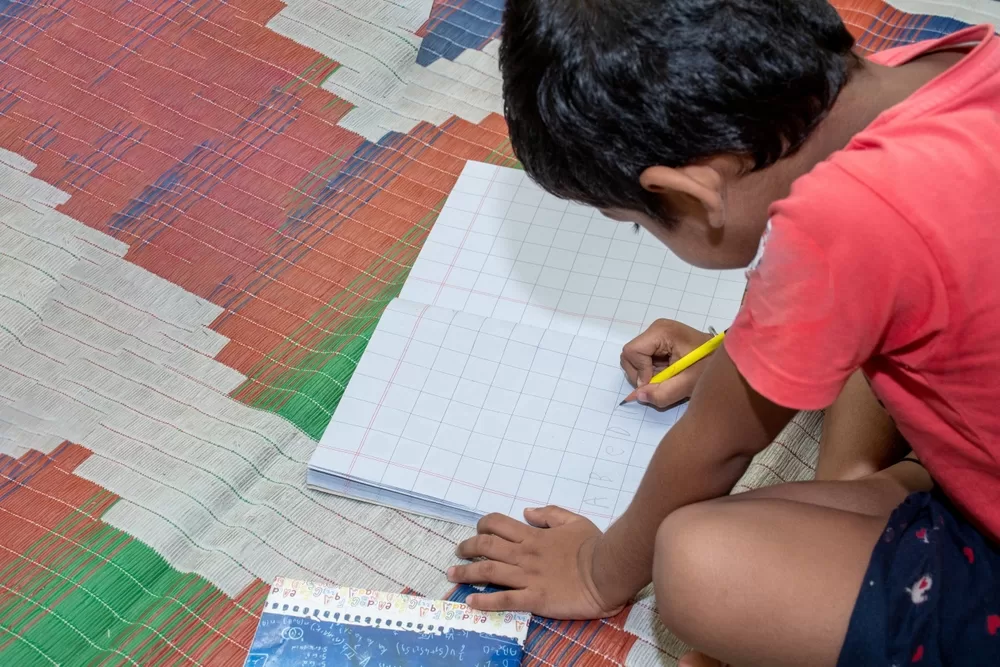
Reading and writing proficiently is undeniably one of the most crucial skills students can acquire during their educational journey.
As a parent, you play a pivotal role to improve literacy skills. Strong literacy skills are the foundation for success in school and beyond.
In this blog post, we will explore the importance of literacy skills and actionable tips to improve students’ reading and writing abilities.
Benefits of Improving Literacy Skills:
Literacy skills are the cornerstone of education and an essential component of a student’s journey towards success. In this article, we will delve into the compelling reasons why it is paramount to develop literacy skills for students, shedding light on the lifelong benefits these skills bring.
1. Unlocking the World of Knowledge
At its core, literacy is the gateway to knowledge. It is the ability to read and understand various forms of written communication, from textbooks and articles to digital content. Developing strong literacy skills allows students to access a vast reservoir of information, enabling them to explore subjects in-depth, conduct research, and broaden their horizons.
2. Empowering Critical Thinking
Literacy goes beyond mere comprehension; it fosters critical thinking. When students engage with written material, they are encouraged to analyze, question, and evaluate the content. This process of critical thinking not only enhances their understanding but also equips them with the skills to assess information critically, distinguishing fact from fiction in an era of information overload.
3. Effective Communication
Proficient literacy skills are the foundation of effective communication. Whether it’s expressing ideas through writing, articulating thoughts verbally, or comprehending the messages conveyed by others, literacy plays a pivotal role. Students with strong literacy skills can communicate confidently and persuasively, which is a valuable asset in both academic and real-world contexts.
4. Career Advancement
In today’s knowledge-based economy, literacy skills are in high demand. Employers seek candidates who can communicate clearly, write persuasively, and analyze information effectively. Students who develop these skills throughout their education gain a competitive edge in the job market, increasing their employability and potential for career advancement.
5. Lifelong Learning
Education doesn’t end with graduation; it’s a lifelong journey. Literacy skills are the compass that guides individuals in their pursuit of continuous learning. Those who have developed a love for reading and writing are more likely to engage in lifelong learning, staying informed, curious, and adaptable in an ever-evolving world.
6. Personal Fulfillment
Beyond the practical advantages, literacy requires many skills to bring personal fulfillment. It opens doors to worlds of imagination, creativity, and self-expression. Students who develop a love for literature and writing often find immense joy and satisfaction in these pursuits, enhancing their overall quality of life.
How to Improve Literacy Skills of Students?
Here’re 15 practical tips to help improve your child’s literacy skills. These tips are designed to foster a love for reading and writing and set your child on the path to becoming a proficient reader and writer.
1. Read Aloud Regularly
Start early by reading to your child daily. Choose a variety of books that capture their interests and engage their imagination. Reading aloud helps develop vocabulary and comprehension skills.
2. Create a Reading-friendly Environment
Dedicate a cozy corner of your home to reading. Fill it with books, comfortable seating, and good lighting. Make it a welcoming space where your child can explore the world of books.
3. Encourage Independent Reading
Allow your child to choose their books and read independently. Give them the autonomy to explore their interests, even if it means reading the same book multiple times.
4. Be a Reading Role Model
One of the top tips to improve reading for students is to let your child see you reading regularly. Children often mimic their parents’ behaviors, and by demonstrating a love for reading, you encourage them to do the same.
5. Discuss What You Read
Engage your child in discussions about the books they read. Ask open-ended questions to encourage critical thinking and deeper comprehension.
6. Visit the Library
Take regular trips to your local library. Let your child select books they want to read and explore different genres. Libraries often offer reading programs and events for children.
7. Set a Reading Routine
Establish a daily reading routine, such as reading before bedtime. Consistency helps create a reading habit that can last a lifetime.
8. Provide a Variety of Reading Materials
Offer a wide range of reading materials, including books, magazines, newspapers, and digital content. Diverse reading experiences enrich vocabulary and broaden horizons.
9. Encourage Writing
Foster writing skills by providing opportunities for your child to write. Encourage them to keep a journal, write stories, or even create their own books.
10. Celebrate Achievements
Celebrate your child’s reading milestones to develop his self-confidence. Offer praise and rewards when they reach reading goals or finish a challenging book.
11. Be Patient and Supportive
Every child progresses at their own pace. Be patient and supportive, providing encouragement rather than pressure.
12. Explore Audiobooks
Audiobooks can be a great way to engage reluctant readers or those with reading difficulties. Listening to stories enhances comprehension and allows children to enjoy books in a different way.
13. Connect Reading to Everyday Activities
Incorporate reading into everyday activities. Have your child read recipes, road signs, and labels. This shows them that reading is a valuable life skill.
14. Join or Form a Book Club
Consider joining a parent-child book club or starting one with friends and neighbors. Book clubs promote discussion and deepen understanding of books.
15. Seek Professional Support When Needed
If you notice persistent reading difficulties, seek support from educators or specialists. Early intervention can address reading challenges effectively.
Supporting Literacy Development for Children with Special Needs
Every child deserves the opportunity to develop strong literacy skills, regardless of their abilities or challenges. For children with special needs, literacy development can be a unique journey that requires tailored strategies and resources.
Here’re 9 tips for supporting literacy development:
1. Individualized Education Plan (IEP):
If your child has special needs, collaborate with their school to develop an IEP that outlines specific literacy goals and accommodations tailored to their abilities.
2. Multisensory Learning:
Utilize multisensory approaches that engage multiple senses, such as touch and sight. Tools like textured letters and interactive apps can be beneficial.
3. Visual Supports:
Visual aids, like picture schedules and visual stories, can enhance comprehension and communication for children with autism or speech and language disorders.
4. Structured Reading Programs:
Look for evidence-based, structured reading programs designed for children with dyslexia, such as Orton-Gillingham or Wilson Reading System as part of the early years foundation stage.
5. Audiobooks and Text-to-Speech Technology:
These tools can make books accessible to children with visual impairments or reading difficulties.
6. Adaptive Tools:
Explore adaptive tools like adapted keyboards or switches to facilitate writing for children with physical disabilities.
7. Sensory Integration:
Create a sensory-friendly reading environment by considering factors like lighting, noise levels, and seating comfort.
8. Regular Reading Aloud:
Read aloud to your child regularly, adapting your approach to their specific needs and preferences.
9. Patience and Encouragement:
Be patient and provide positive reinforcement. Celebrate small achievements and progress.
Conclusion
By implementing these tips, you can create a nurturing environment that fosters your child’s literacy skills. Remember that building strong literacy skills is a gradual process, and your encouragement and support are invaluable.
Together, you can open the door to a world of knowledge, imagination, and endless opportunities for your child.
